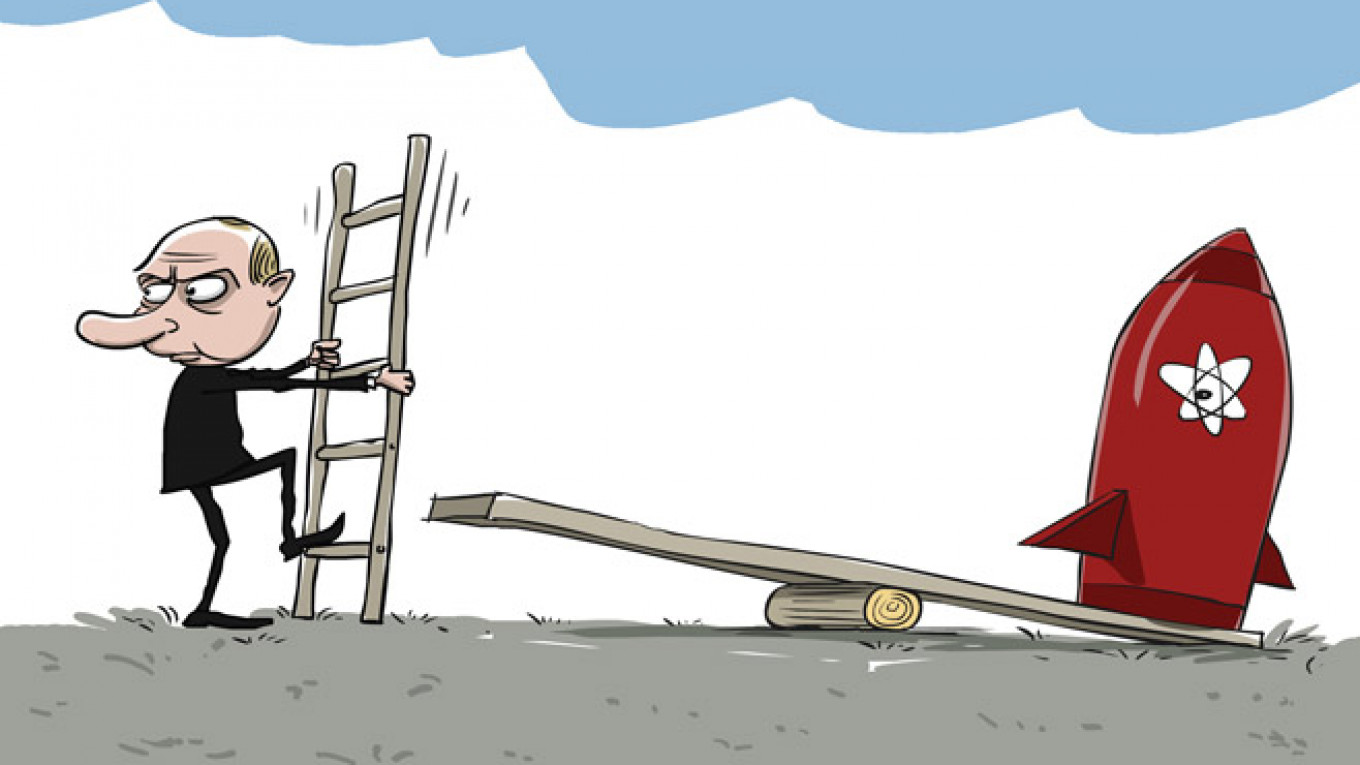The Kremlin promised to give the world a New Year's gift this December: a new version of Russia's military doctrine. Last fall, President Vladimir Putin ordered changes to the country's main unclassified document in response to the Ukrainian crisis and U.S. plans to deploy a missile defense system. The world froze in horrified anticipation: After Putin justified the annexation of Crimea on the pretext that the peninsula is "sacred ground" for Russia, it seemed anything was possible in terms of military doctrine.
What's more, frightening rumors emerged from time to time suggesting that Russia might introduce a provision to the document allowing for a pre-emptive nuclear strike — that is, indicating Moscow's readiness to start a world war. The worst part is that, in the context of recent events, that idea did not seem so implausible. In fact, four years ago Security Council Secretary Nikolai Patrushev promised in an interview with Izvestia that such changes would appear in the doctrine.
Now we can breathe a sigh of relief. A senior Security Council official told news agencies that "the article concerning Russia's use of nuclear weapons remains unchanged in the new draft of the military doctrine." The voice of reason won out.
After all, had the military brass inserted a clause permitting a pre-emptive strike, the United States would definitely have reinstated the concept of a "launch on warning" retaliatory strike whereby it launches its missiles immediately after learning that the enemy has launched theirs. Recall that U.S. President Barack Obama instructed the Pentagon 18 months ago to explore the possibility of eliminating the concept of a retaliatory strike from U.S. military doctrine.
However, there is bad news along with the good. According to that same source, or perhaps some other, Russia's military doctrine will now include something called "non-nuclear deterrence."
The source told journalists, "Objective reality is now such that new threats and military challenges require a response. In particular, these include hybrid war, our potential enemy's plans for implementing the concept of a 'geocentric theater of operations,' a 'global strike' and a 'network-centric space.' A non-nuclear system of containment is one such response," he said. He added that the air force and navy would shoulder the main burden of ensuring that "containment."
The idea of nuclear deterrence based on the threat of "mutually assured destruction" is clear. The question here is how Russia can mount such a threat without nuclear weapons. At the very least it would have to achieve parity with NATO in conventional weapons.
However, that is impossible at present. Even after the Kremlin spends the colossal sums it has allocated for modernizing the army, NATO forces will still outnumber Russia's several times over. What's more, Russia's negative demographic trend makes it physically impossible for the army to field more than 800,000 men, with the result that even if Russia were to miraculously produce as many ships and airplanes as NATO has, it would still lack the personnel to man them.
The experts I consulted cynically suggested that "non-nuclear deterrence" refers to a conventional arms race — one that will completely ruin the national economy but that will generate huge profits for a handful of officials overseeing the various branches of the armed forces.
However, "non-nuclear deterrence" very possibly refers to the crusade the Kremlin has announced against "color revolutions," which it believes Western intelligence services conspire to unleash. An unnamed official involved in revising Russia's military doctrine stated: "Events in and around Ukraine have added challenges and threats with which everything before pales in comparison." This suggests that "non-nuclear deterrence" might refer to the very type of hybrid war Russia is currently waging in Ukraine.
Part of this strategy might include making self-declared territories allies. The same unnamed source told reporters: "The updated version of the military doctrine will include an article on the creation of a single defense space with Abkhazia and South Ossetia as military allies of Russia."
That source stated very candidly that in the current geopolitical situation "it is an extremely important doctrinal statement … especially given the fact that Russia has literally only one or two military allies." He added that the article in question is "probably only declarative in nature for now. It has yet to be given concrete expression, although that might not happen."
Or will it? Perhaps Moscow will soon announce that it recognizes the independence of the self-declared Donetsk and Luhansk republics seized by pro-Russian separatists and officially list them as allies. In that way Putin will form his greater "Russian world."
Alexander Golts is deputy editor of the online newspaper Yezhednevny Zhurnal.
A Message from The Moscow Times:
Dear readers,
We are facing unprecedented challenges. Russia's Prosecutor General's Office has designated The Moscow Times as an "undesirable" organization, criminalizing our work and putting our staff at risk of prosecution. This follows our earlier unjust labeling as a "foreign agent."
These actions are direct attempts to silence independent journalism in Russia. The authorities claim our work "discredits the decisions of the Russian leadership." We see things differently: we strive to provide accurate, unbiased reporting on Russia.
We, the journalists of The Moscow Times, refuse to be silenced. But to continue our work, we need your help.
Your support, no matter how small, makes a world of difference. If you can, please support us monthly starting from just $2. It's quick to set up, and every contribution makes a significant impact.
By supporting The Moscow Times, you're defending open, independent journalism in the face of repression. Thank you for standing with us.
Remind me later.







